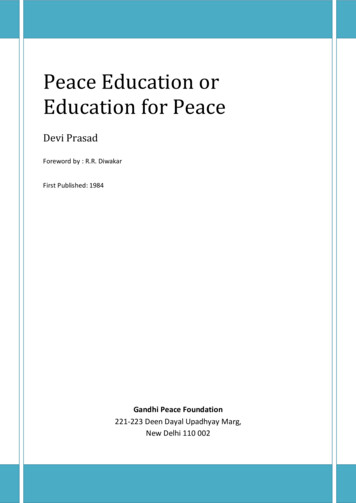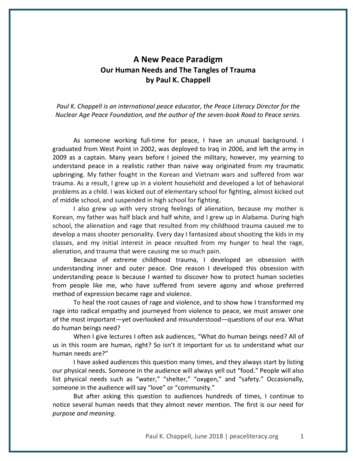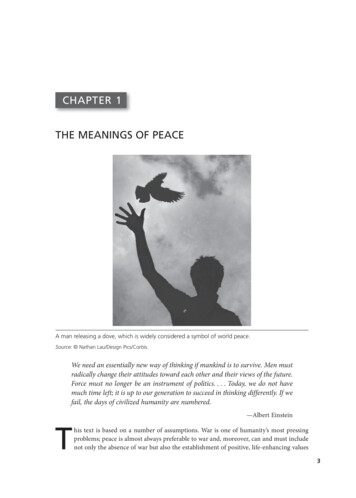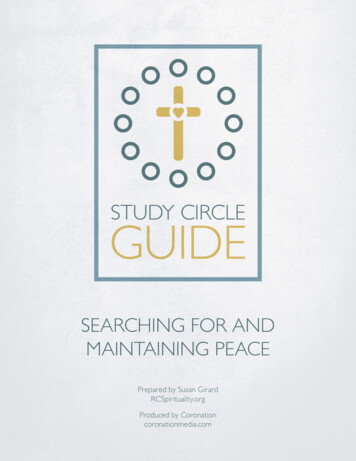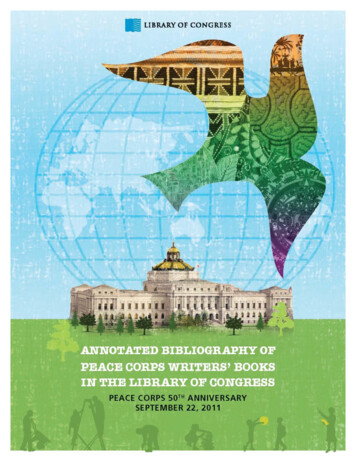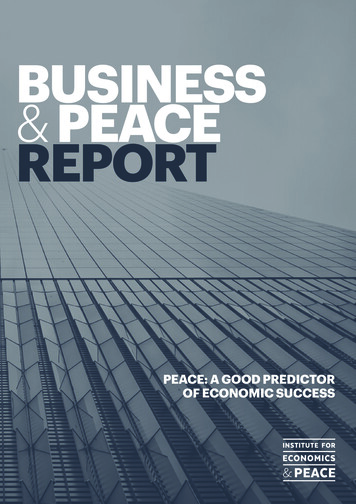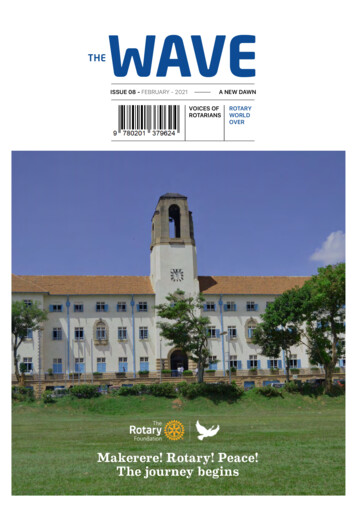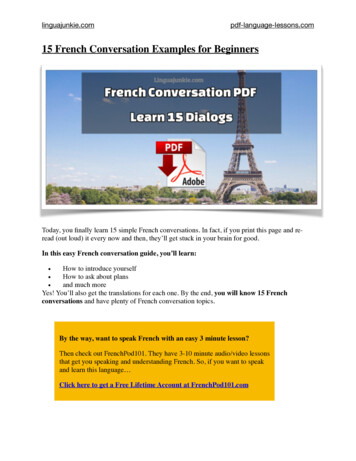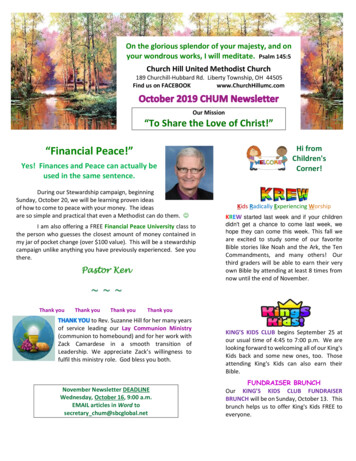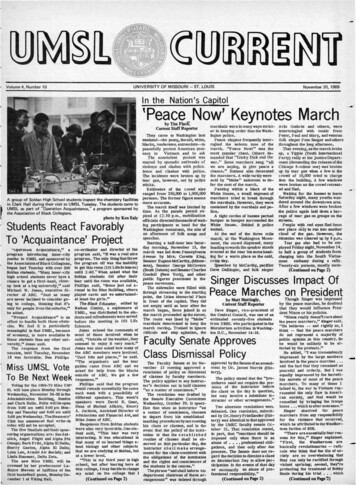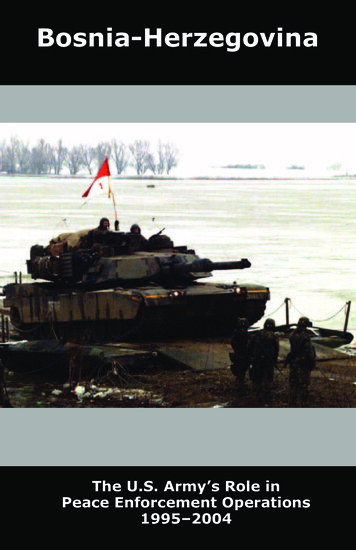
Transcription
conversationpeaceTHE POWER OF TRANSFORMED SPEECHmary a. kassianLifeWay Press Nashville, Tennessee
LifeWay Press 2014 Mary A. KassianNo part of this book may be reproduced or transmitted in any form or by anymeans, electronic or mechanical, including photocopying and recording, or by anyinformation storage or retrieval system, except as may be expressly permitted inwriting by the publisher. Requests for permission should be addressed in writing toLifeWay Press ; One LifeWay Plaza; Nashville, TN 37234-0152.ISBN 9781430038801Item 005706020Dewey decimal classification: 302.2Subject headings: GOSSIP \ CONVERSATIONUnless otherwise noted, Scripture taken from the Holy Bible, NEW INTERNATIONALVERSION . Copyright 1973, 1978, 1984 by Biblica, Inc. All rights reserved worldwide.Used by permission. Scripture quotations marked (ESV) are from The Holy Bible,English Standard Version (ESV ), copyright 2001 by Crossway,a publishing ministry of Good News Publishers. Used by permission.All rights reserved. Scripture quotations marked HCSB are taken from the Holman ChristianStandard Bible , Copyright 1999, 2000, 2002, 2003, 2009 by Holman Bible Publishers.Used by permission. Holman Christian Standard Bible , Holman CSB ,and HCSB are federally registered trademarks of Holman Bible Publishers.Scripture marked (NKJV) taken from the New King James Version .Copyright 1982 by Thomas Nelson, Inc. Used by permission. All rights reserved.Scripture quotations marked (NLT) are taken from the Holy Bible, New Living Translation,Copyright 1996. Used by permission of Tyndale House Publishers, Inc., Wheaton, IL 60189USA. All rights reserved. Scripture quotations marked RSV are taken from theRevised Standard Version of the Bible, copyrighted 1946, 1952, 1971, 1973.Scripture quotations marked (TLB) are taken from The Living Bible, copyright 1971.Used by permission of Tyndale House Publishers, Inc.,Wheaton, IL 60189 USA. All rights reserved.To order additional copies of this resource, write to LifeWay Church Resources,Customer Service, One LifeWay Plaza, Nashville, TN 37234-0113;fax 615.251.5933; phone 800.458.2772; order online at www.lifeway.com or emailorderentry@lifeway.com; or visit the LifeWay Christian Store serving you.Printed in the United States of AmericaAdult Ministry Publishing, LifeWay Church Resources,One LifeWay Plaza, Nashville, TN 37234-0152
CONTENTSWelcome . . . . . . . . . . . . . . . . . . . . . . . . . . . . . . . . . . . . . . . . . . 4About This Study . . . . . . . . . . . . . . . . . . . . . . . . . . . . . . . . . . . 5WEEK 1: The Power of Navigation . . . . . . . . . . . . . . . . . . . . 6WEEK 2: The Power of Cause and Effect . . . . . . . . . . . . . 36WEEK 3: The Power of Exchange . . . . . . . . . . . . . . . . . . . 66WEEK 4: The Power of the Open Gate . . . . . . . . . . . . . . . 96WEEK 5: The Power of Construction. . . . . . . . . . . . . . . . 126WEEK 6: The Power of Instruction . . . . . . . . . . . . . . . . . . 156Leader Guide. . . . . . . . . . . . . . . . . . . . . . . . . . . . . . . . . . . . . 1873
WELCOMEWelcome to the revised and updated ConversationPeace Bible study! You’re about to embark ona learning adventure that will transform yourspeech from the inside out. Conversation Peacewill enhance your communication skills andhelp you improve your relationships one word ata time. Since first published in 2001, this awardwinning Bible study has helped tens of thousandsof women experience the power of transformedspeech.In this revised edition, you’ll get all the greatMARY A. KASSIANstudy material from the original workbook . . .plus fresh graphics, new introductions to weeklylessons, and new summaries of conversation themes and the challengesthey present. There are extra questions to help you ponder what you’velearned, as well as a summary of key application points to help youremember and practice your new communication skills. In addition, we’veincluded space for you to journal and express your thoughts. There’s a newwebsite—www.conversation-peace.com where you can download someextra resources, as well as www.lifeway.com/conversationpeace.At their deepest root, communication problems are spiritual problems.As such, they require spiritual solutions and, for that, we must turn toGod. This study presents powerful speech-transforming elements that arebased on the Bible. For the final word on how to transform our words, theBible is our book! It sets a high standard for speech and also for thoughtsand attitudes. But even more important, it reveals the secret for how toreach that standard—God’s power.Mary Kassian is an award-winning author, popular speaker, and adistinguished professor of women’s studies at The Southern BaptistTheological Seminary. She has published several books, Bible studies, andvideos, including: Girls Gone Wise, In My Father’s House: Finding YourHeart’s True Home, and True Woman 101 and 201. Mary and her family livein western Canada. The Kassians enjoy their three adult sons and theirexpanding families (grandkids are awesome!), watching sports, biking,hiking, snorkeling (when they can find some warm water), music, boardgames, mountains, campfires, and their family pets: “Miss Kitty” and blacklab “The Queen of Sheba.”4Conversation Peace
ABOUT THIS STUDYDo you want to experience the power of transformed speech?Conversation Peace is an interactive Bible study that includes challengingdiscussion for small groups. The member workbook provides six weeks ofdaily, individual study materials for use between sessions.DAILY LESSONS he daily lessons, to be completed on your own, shouldTtake no more than 20 minutes. Each week’s lessons willhelp you harness the power of a speech-transforming element: the power of navigation, power of cause and effect,power of exchange, power of the open gate, the power ofconstruction, power of instruction, and power of return.TONGUE TONICAccording to the dictionary, [ton ic] ton ik, [Gr. tonikos]describes a solution that maintains, increases, or restoresthe health of the system or organ. The Tongue Tonicsexplored in this study contain practical concepts andskills to help increase or restore the health of your speech.Whenever you see the symbol, stop and take a dose.WORD FROM THE WORDEach Word from the Word defines, explains, and helps youunderstand how to apply certain words from the Bible.God’s Words will stimulate you to think about the way youuse words. Study each Word from the Word and watch yourvocabulary grow strong and healthy!QUIPS AND QUOTESA lot of noted historical and religious persons have saidgood things about how to use our mouths. Profound, witty,and wise, Quips and Quotes are sure to inspire and challenge you.BREATH FRESHENERFreshen your breath by memorizing the Scripture verse forthe week. Cut-out cards are available at www.lifeway.com/conversationpeace so you can tuck Breath Fresheners intoyour purse or pocket.About This Study5
WEEK 1THEPOWER OFNAVIGATION“For ‘whoever desires to love life and see good days, let him keephis tongue from evil and his lips from speaking deceit; let himturn from evil and do good; let him seek peace and pursue it.’ ”1 PETER 3:10-11, ESV
Where do you want to sail today?The Greek ferry was on autopilot. Captains are requiredto man the bridge for the lastseven miles approaching port, buthe had sailed this route six to eighttimes a week without incident.Confident of the autopilot settings,the captain took a nap while thefirst officer and crew left the bridgeto watch a soccer match on television. No one noticed when strongundercurrents caused the MSExpress Samina to drift off course.Two miles from its destination,the vessel struck a rocky islet andsank. The islet was clearly markedwith a light beacon; no attentiveseaman would have missed it. Butthe captain was sleeping, unawarethat his autopilot was steering theship toward disaster. Eighty-twolives, mostly tourists, were lost.The Express Samina wasshipwrecked en route to the beautiful Aegean island of Paros. Thetravelers’ exciting and promisingvacation ended in unspeakabletragedy and loss. The captain andcrew were charged with murder,neglect of duty, and violation ofmaritime procedures. The disasterwas one of the worst nautical accidents in Greece’s history.How foolish of that captain toabandon the helm and neglect thewheel of his vessel. And yet that’sprecisely what we do when we putour minds and mouths on autopilotand fail to pay attention to thewords coming out.Do you realize that your tongueis a steering mechanism? James 3:4likens it to the rudder of a ship.Your tongue navigates your ship.The word navigate comes fromthe Latin words navis, meaning shipand agere, to drive. To navigate isto plan, steer, and manage one’smovement and course. The apostleJames notes that though shipsare driven by strong winds, theyare steered by a very small rudderwherever the pilot wants to go. Ifa ship is not directed, it will be atthe mercy of the wind and currentsand will be lost or shattered on therocks.Do you want your relationshipsto move in a good direction? Toexperience the power and blessingof transformed speech?Where you sail todaydepends on whatyou say today.By properly steering yourtongue, you will be better able toavoid disaster and direct your lifealong the right course. And, in theprocess of harnessing the power ofnavigation, you’ll go to all sorts ofbeautiful and fascinating places.The Power of Navigation7
DAY ONEUNDERSTANDING THE ROLEOF THE RUDDERThe tongue is our principal steering mechanism.“So also the tongue is a small thing, but what enormousdamage it can do. A great forest can be set on fire by one tinyspark. And the tongue is a flame of fire. It is full of wickedness,and poisons every part of the body and can turn our wholelives into a blazing flame of destruction and disaster.”JAMES 3:5-6, THE LIVING BIBLEI remember the summer my youngest son made his maiden voyage ascaptain of the fishing boat. This rite of passage happens at about thetwelfth year for every Kassian. As instructed, the new captain displayshis skill by taking five or six passes close to the shoreline bordering thecabin. Dad, Mom, Grandma, Grandpa, aunts, uncles, siblings, and otherspectators in the vicinity shout and cheer. Camcorders whir. Shutters snap.iPhones upload to Instagram.The highlight of the demonstration occurs when the captain navigates theboat around in a broad circle and pulls back in along the pier. Victoriously,he turns off the motor, docks the boat, and runs ashore to receive hisaccolades. Passing this test earns him the right to take the small boat outby himself to go fishing in front of the cabin.Steering a boat is based on a relatively simple concept: the principle ofunequal water pressures. When a rudder is turned so that one side ismore exposed to the force of the water, the stern (back) of the boat rotatestoward the side of the rudder where the water pressure is less.In small craft the rudder is connected to a handle called a tiller and turnedmanually. In larger vessels, it is turned by hydraulic, steam, or electricalmachinery. In all cases, the rudder is relatively small but is responsible forsetting the direction of the entire vessel.8Conversation Peace
This week we’ll study the first element of transformed speech—the Powerof Navigation. Just like a rudder, we’ll see how our tongues turn our livesin the direction we will go.Read James 3:2-6. Note the illustrations James uses for thetongue (vv. 3-4): a bit in a horse’s mouth and a rudder for aship. Describe what might happen depending on how eachobject is used.objectused incorrectlyused correctlyBit in horse’s mouthRudder of a shipIn what ways do these illustrations reflect the situationwith our tongues?James wants us to realize that our tongues are our principal steeringmechanism. What we talk is where we’ll walk. If we use our tongues forgood, we will head in the right direction. Conversely, if we use our tonguesfor evil, we will steer our ship toward destruction.THE TONGUE IS A SPARK OF FIREIn James 3:6, James compares the tongue to a spark of fire that burns downan entire forest. According to James, the tongue sets the whole course ofa person’s life on fire. In the American Standard Version of the Bible, thephrase “whole course” is translated as “the cycle of nature.” The Greekword is trochos, which means genesis or beginning. By using this word,James implied that the tongue is the hub—the beginning—of “the wholeround of human life and activity.”1The Power of Navigation9
Below or in the margin, record the first names of some of yourfamily members, friends, coworkers, or neighbors.Your tongue affects all the relationships you recorded! It is the hub thatimpacts the whole, complete, or entire circle of your life.If the hub of a wheel is on fire, the fire can quickly burn in all directionsdown the spokes to the rim of the wheel. From the burning hub, the entirewheel can be engulfed in flames. James’s point is that our tongues play acentral, “hub-like” role in our lives. A small spark of evil on our tongue hasthe capacity to destroy our relationships and even our whole lives.Sparks remind me of what happened to my older brother, David, who wastrying to light a coal barbecue. He tried repeatedly but it wouldn’t light. Asa final resort, he decided to use gasoline. He did not know that a spark toosmall to see had, in fact, taken hold in the coals. It didn’t let off any noticeable smoke or heat but when David poured gasoline on the coals, thewhole barbecue exploded. His burns, to more than 70 percent of his body,were life threatening. Thankfully, by the grace of God, he recovered. But hehad to endure excruciating pain and months of rehabilitation.Not many of you have experienced the pain of badly burned flesh, butmany of you have experienced the pain of badly burned relationships. Lifehas poured gasoline on your coals. The sparks hidden in your tongue andin the tongues of your loved ones have exploded into a destructive fire.The pain—and the rehabilitation—will be lengthy.STEER IN THE RIGHT DIRECTIONHow we choose to use our tongues—for good or for evil—affects our entirelife. Its use affects the type of person we become and the type of experiences we have.Read Proverbs 12:5-8,13-22. In the appropriate space, summarizethe characteristics and life experiences of those who use theirtongues for evil (wickedness) and those who use their tonguesfor good (righteousness).10Conversation Peace
use tongues for eviluse tongues for goodOur Breath Freshener for the week (see p. 6) sums up twobenefits of controlling our tongues. What are they?Benefit 1:Benefit 2:Like a rudder, our tongues set the direction for our lives. Using them in the rightway will bring us blessing. We will lovelife and see good days.A word is dead when it issaid, some say. I say it justbegins to live that day.—EMILY DICKINSONHow do you begin to steer your vessel in the right direction? Our BreathFreshener provides a clue: “turn from evil and do good; seek peace andpursue it.” To pursue means to chase after. A pursuit requires time, energy,and commitment. Turning, or changing, our words from evil to good alsorequires time, energy, and commitment. Above all, it requires study to findout what God has to say about how to use our mouths and to ask Him tohelp us use them in the right way.Close today’s lesson by praying through and personalizing this week’sBreath Freshener. And don’t forget to take today’s dose of Tongue Tonic,which explains the three parts of a message.The Power of Navigation11
Three Partsof a MessageWhen we interact with others, themessages we send are made up ofthree parts: (1) verbal—the wordswe speak; (2) vocal—the tone ofour voice; and (3) visual—our bodylanguage.versatile. We can emphasize certain words; clip, force, or softenwords; speak in a lilting, sing-songy,mimicking, or sneering tone; speakrapidly or slowly; over- or under-articulate, raise or lower the volume;and/or change the pitch. The possibilities are endless.Tone of voice contributes 38 percentto the overall message.55%38%VISUALVOCAL7%VERBALVERBAL: We express our thoughtswith words. Those words can beprecise or imprecise, accusing (“Youare ”), intense or mild (furious vs.annoyed), vague (“sort of”), pleadingor demanding.2Although words are invaluable inarticulating our thoughts and ideas,research indicates that in personalinteraction, words only contribute7 percent to the overall message.VOCAL: More important than thewords we speak is the tone of voicewe use. Our voices are incredibly12Conversation PeaceVISUAL: Body language is the final,and most important, part of interpersonal interaction. Again, thepossibilities are endless. Considerhow these visual cues affect themessage: roll eyes, shake, or tilthead, shrug shoulders, frown, purselips, squint, raise eyebrows, furrowbrow, cross arms, glare, sneer, lackof eye contact, rapid blink, glanceside to side, point finger, exaggeratearm/hand gestures, tap fingers.Visual cues contribute 55 percent tothe overall message.All three parts of a message mustalign and be consistent for the message to be believed. For example, ifyou say you accept someone, butyou say it with a tense voice andcrossed arms, chances are he or shewon’t believe you. For the messageto be clear, all three parts must “say”the same thing.
DAY TWOLAUNCHING A WARSHIPOR MERCHANT SHIPThe tongue can be used as a weapon or a tool.“She [The wife of noble character] is like the merchant ships.”PROVERBS 31:14When it comes to preparing meals, I’m the practical type. “Fast” and“simple” are the two characteristics of all my recipes. With a house full ofboys, “voluminous” and “cheap” were added to my list of menu requirements. On the other hand, my husband, Brent, enjoys spending a Saturdayor Sunday afternoon chopping and mixing exotic ingredients in order tosauté, baste, braise, or broil the latest dish featured on his favorite cookingshow. (Bam!—throw in some spices and kick it up a notch!)Often Brent complains about the condition of our kitchen knives. Thebargain-store set we received as a wedding gift just were not cutting it(pardon the pun). How could he achieve culinary excellence when hisscallions and shallots were getting mulched instead of thinly sliced? Hisfrustration reached such a point that one day I found all my knives, saveone, in the garbage can. (Being the practical type, I rescued them.)For our anniversary, I will give Brent a set of heavy-duty, professional chefknives. They lie in wait on black velvet in a glass-and-aluminum-enclosedcase. Just a few moments ago, I opened the case and lightly brushed mythumb against the edge of the largest knife. It’s sharp. An edge like that iscertain to cut.A sharp knife is an essential tool for cooking, but a sharp knife can also beused as a weapon. The same edge can create or kill, depending on how it isused. The Hebrew word mouth (peh) is often translated edge. Like a knife,the tongue has a sharp, powerful edge that can either create or destroy. Itfunctions as a helpful tool or a destructive weapon—depending on its use.Read Psalm 57:4. Put your creative talents to use and describeor draw what David’s enemies might have looked like.The Power of Navigation13
David’s enemies probably carried weapons in their hands, but theseweapons concerned him the least. The potential to cut him most deeplywere the sharp edges of his enemies’ tongues.According to Psalm 64:3-4, what did David’s enemies do withtheir tongues?A wound inflicted by the tongue bleeds the spirit more severely than awound inflicted by the sword bleeds the flesh.Have you ever felt wounded by thesharp edge of someone’s tongue? Haveyou ever felt ambushed? Attacked? Cut—ROBERT BURTONto pieces? I have. People have hurt medeeply with their words. But it’s soberingto realize that my mouth carries the same edge as theirs. It has the samedestructive potential.A blow with a wordstrikes deeper than ablow with a sword.Connect the verses with the words that describe the destructivepower of the tongue.Psalm 140:3Lash (NIV) or scourge (NKJV)Proverbs 16:27Snare or trapProverbs 18:7Scorching fireJob 5:21 Deadly arrowJeremiah 9:814Conversation PeacePoison of vipers
God wants us to be aware of the potential of our tongues—potential forevil and for good. According to Proverbs 12:18, we use our tongues for evilwhen we speak recklessly. Reckless words “pierce like swords.” The sameverse outlines what happens when we use our tongues wisely, as a tool.What happens when we use our tongues wisely? (Choose one.) The sword chops us up. We get a mouth full of dirt. We dig our enemy’s grave. Our words bring healing.In the ancient world, swords were the most common weapons of war. TheBible tells us that, during war, the Hebrews would make swords from theirplowshares (see Joel 3:10). A plowshare is the cutting edge of a plow—theagricultural tool that cuts furrows in the soil and prepares the ground forplanting. When peace returned, the Hebrews hammered the swords backinto plows (see Isa. 2:4; Mic. 4:3). The edge that killed the enemy in warwas the same edge that helped provide food in peace. The sharp edge hadtwo functions.Likewise, our tongues can operate in one of two ways: we can declare warand use it to pierce, wound, and kill; or we can use it as an instrument ofpeace, plowing the soil of our relationships to make them rich and fruitful.Consider the words that came out of your mouth in the past fewdays. Were there times you used your mouth as a sword? Yes NoCan you think of instances when you used the edge ofyour tongue in a positive way, to open up the soil of yourrelationships, helping them become rich and fruitful? Yes NoThe Power of Navigation15
Are you consistently using your mouth as a tool to cultivate abountiful harvest? Yes, I consistently use my mouth as a tool to positivelycultivate all my relationships. I am inconsistent. Sometimes I use my mouth as a tool tocultivate, and sometimes I use it as a weapon to harm. No, I often use my mouth as a weapon and have difficultyusing it as a tool to improve my relationships.LAUNCH THE RIGHT KIND OF SHIPIf you choose to use your tongue as a sword, your relationships will experience perpetual calamity. If you choose instead to put your sword into itssheath (a mark of peace and friendship), pound it into a plow, and till thesoil of your relationships, you will reap rich rewards (see Prov. 12:14).The word plow (Latin—aratio) literally means, to open up the soil. It isclosely related to the Anglo-Saxon ar from which we derive the Englishword oar—a rudder that plows the sea. As we learned, the tongue is ourprincipal steering mechanism, the rudder that sets the direction of ourvessel. Understanding the role of the rudder is the first part of harnessingthe power of navigation. Launching the right kind of ship is the second.In ancient Rome, two types of ships sailed the seas: warships and merchant ships. The merchant ships were large, high-sided vessels with two orthree masts that flew square sails. Their primary purpose was to transportgrain from Egypt to Italy to feed the expanding Roman population.The warships were visibly different. They carried dozens of fighting menand were equipped with catapults and ramming rods. Instead of beingpropelled by wind-billowed sails, the warships were propelled by banks ofoarsmen: prisoners and slaves chained under the ship’s deck. Comparedto the merchant ships, warships were lighter, longer, and more slender—designed for rapid attack and evasive maneuvers.A sharp tongue is the onlyedge tool that grows sharperwith constant use.—WASHINGTON IRVING16Conversation PeaceWill you use your tongue as a sword ona warship or as a plow to fill a merchantship with nourishing grain? If you havebeen using your tongue as a weapon,will you ask God to help you pound thatsword into a plow? He is faithful to help.
Sending a MessageWhen a person sends a message, it is encoded—packaged—through his or her personality, emotions, attitudes,assumptions, habits, past experiences, and current environment. A person who is stressed will encode a message differently thansomeone who is relaxed. A passive person will encode a message differently than an aggressive individual. Someone who values frankness willencode a message differently than one who values tact.An encoded message is presented behaviorally—through words, tone ofvoice, and body language. The receiver observes this behavior and decodesthe message based on his or her own personality, feelings, attitudes,assumptions, habits, past experiences, and current environment. That iswhy two people listening to the same speaker can receive two entirelydifferent messages.The Communication LoopThe process of sending and receiving messages is normally not a one-waystreet. In person-to-person communication, each individual sends andreceives messages simultaneously. As I am talking, I am also observingand decoding your response. As you are observing and decoding mybehavior, you are encoding and sending messages with your behavior. Ourinteraction forms a communication loop.Eight Potential ProblemsIn each communication loop, there are eight potential problems.Miscommunication can occur when either person has difficulty encodinghis or her message or decoding the other person’s message. It can alsooccur when either person’s behavior does not match the intendedencoding, or when either person is faulty in his or her observation of theother person’s behavior. In an interaction where each person speaks onlyone sentence, there are 16 ways in which miscommunication can occur!1. Person A’s encoding2. Person A’s decoding3. Person A’s observation4. Person A’s behavior5. Person B’s decoding6. Person B’s encoding7. Person B’s behavior8. Person B’s observationThe Power of Navigation17
DAY THREESETTING OUT ON COURSEThe chart maps the way of wisdom.“How much better to get wisdom than gold!To get understanding is to be chosen rather than silver.The highway of the upright turns aside from evil;whoever guards his way preserve his life.”PROVERBS 16:16-17 (ESV)Drive past Walmart until you get to the gas station. Turn left. Drive forabout five minutes. When the road curves to the right, look for a greenmailbox. Our house is the one with the big black dog in front.Have you ever tried to follow poor directions? Chances are that somewhere along the way you’ll miss a turn and never get back on course. Iremember missing a wedding shower when a friend gave me directionsthat omitted one important turn. After driving around in circles out in thecountry for an hour-and-a-half, I finally gave up and returned home.If you want to get where you’re going, good directions—or a reliableGPS—are crucial. Thankfully, we’re not left on our own to navigate our waythrough the waters of life. The Bible charts a course for us. The instructions are clear. The directions are good. The prompts are reliable. In theBook of Proverbs, the Bible’s route is identified as the way of wisdom.HOW DO WE KNOW WE ARE ON COURSE?Proverbs 4:5-27 records what a wise father once told his son about settingout on the right course.Read this passage in your Bible. Depending on the translation,the words straight, light, level, and firm describe characteristicsof the way of wisdom. The path of foolishness is just theopposite: crooked, dark, uneven, and treacherous.18Conversation Peace
Read Proverbs 23:15-16. Select the answer that states how theway of wisdom would affect the son’s speech: He would become a politician. He would speak what is right. He would malign his enemies. He would stop stuttering.The father would be able to tell if his son were following the way ofwisdom by observing the way the son used his mouth. Those who walkin wisdom avoid perverse, corrupt speech. The son’s speech would be theprimary indicator as to whether or not he was on course.It’s the same with us. Our mouths indicate whether we are on course. Ifwe are steering our vessels the right way, our lips will speak what is right.Indicate what each verse tells us to do or to avoid in order tonavigate the way of wisdom.Proverbs 3:17Proverbs 14:5Proverbs 20:19Ephesians 5:4Philippians 2:141 Thessalonians 5:11HOW DO WE FIND WISDOM?Where can we go to find wisdom? A quick search on the Internet presentsall sorts of possibilities—Buddhism, Witch Wisdom, Islam, Kabbalah, DalaiLama, Metaphysics, ancient philosophers, the Ascended Masters, LotusGardens—the list goes on and on.The advice is often contradictory. In search of wisdom I could shave myhead, grow my hair long, wear weird clothes, chant and hum, remainsilent, light candles, burn incense, fast, feast, join a commune, meditatein solitude, or become a disciple of numerous spiritual leaders and guides.With all these options, how can we find a source of wisdom that’s reliable?The Power of Navigation19
The Bible tells us that there are two types of wisdom: the wisdom thatcomes from heaven, and a counterfeit wisdom that is “earthly” and“unspiritual” (Jas. 3:13-17).According to Colossians 2:2-4, where are all the treasures oftrue spiritual wisdom and knowledge hidden?Wisdom is oftentimesnearer when we stoopthan when we soar.What would be the result if theColossians did not find thesetreasures? (v. 4)—WILLIAM WORDSWORTHLet’s take a moment to learn more about this source of spiritual wisdom.[word]A SPECIAL MESSAGEWord can be defined this way: the smallest unit of meaningful linguistic communication. We all know what words are. But do youknow that the Bible refers to the Word as a special type of communicationfrom God? In the Old Testament, the term the Word of God is used 394times to identify a message—a commandment, prophesy, warning, orencouragement—God spo
Scripture quotations marked (ESV) are from The Holy Bible, English Standard Version . In this revised edition, you’ll get all the great study material from the original workbook . . . plus fresh graphics, ne
